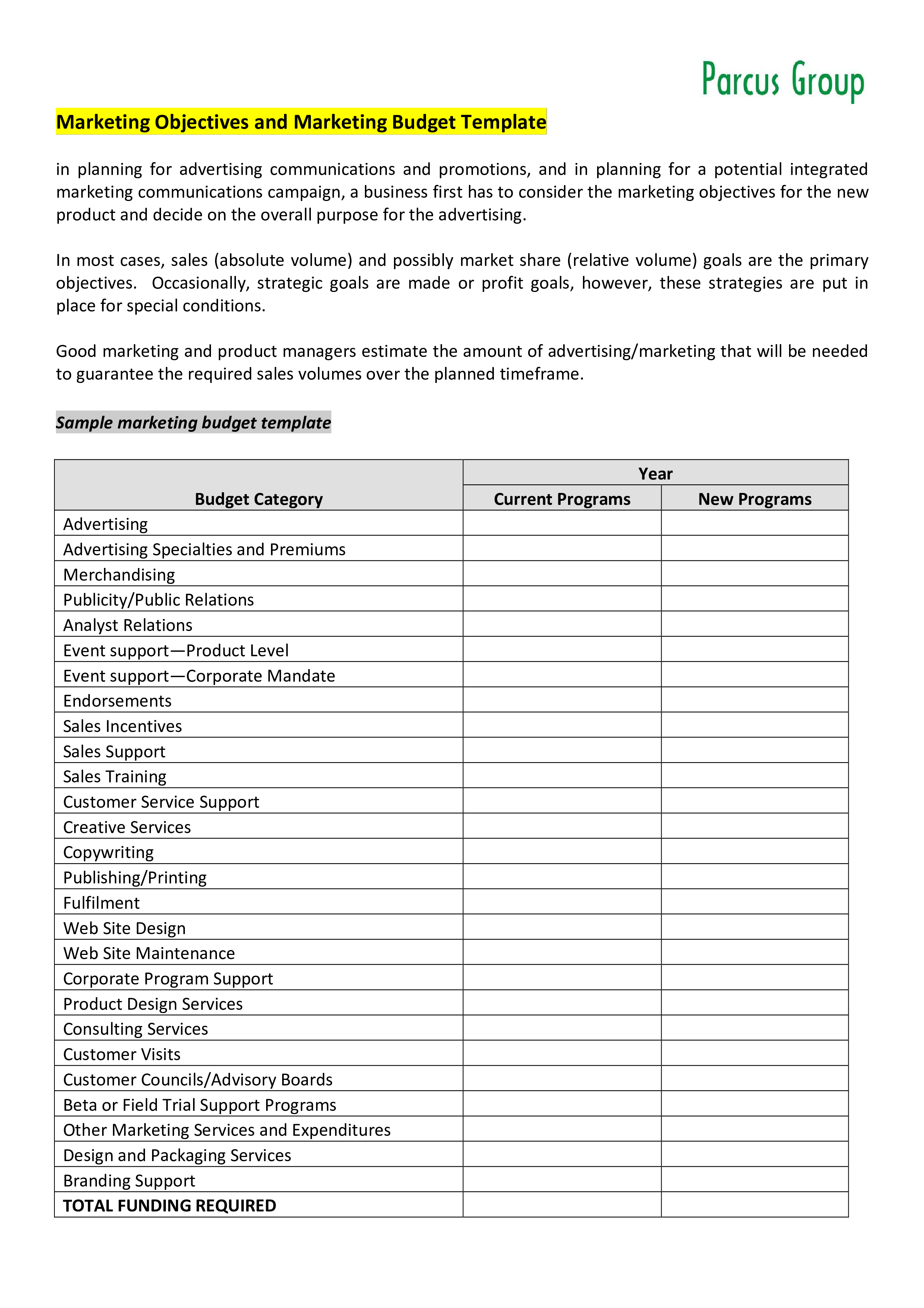Marketing Objectives and Marketing Budget Template
Sponsored Link免费模板 保存,填空,打印,三步搞定!

Download Marketing Objectives and Marketing Budget Template
Adobe PDF (.pdf)- 本文档已通过专业认证
- 100%可定制
- 这是一个数字下载 (53.05 kB)
- 语: English
Sponsored Link
How should I make my budget for marketing objectives? What are the advantages of having a marketing budget? Our sample template is designed to help you easily create and track your marketing objectives and budget. They are user-friendly and can be customized to fit your specific goals and objectives. Download this professional Marketing Objectives and Marketing Budget Template template now!
Marketing Objectives and Marketing Budget are two crucial components of a company's marketing plan. They work in tandem to guide marketing strategies and allocate resources effectively to achieve specific goals.
Marketing Objectives:
Marketing objectives are the specific, measurable goals that a company aims to achieve through its marketing efforts. These objectives are a critical part of a marketing plan as they provide focus and direction for the marketing team. Marketing objectives should be aligned with the overall business goals and may include the following:
- Increasing Sales: This is a common marketing objective, aiming to boost revenue by attracting more customers or increasing the average transaction value.
- Enhancing Brand Awareness: Building or improving brand recognition is a common objective for businesses seeking to establish themselves in the market or increase their market share.
- Expanding Market Share: Some companies focus on gaining a larger piece of the market by increasing their share relative to competitors.
- Customer Acquisition: Attracting new customers to the business is another primary objective, often measured by the number of new customers or leads generated.
- Customer Retention: Retaining existing customers is essential for many businesses, aiming to improve customer loyalty and reduce churn rates.
- Launching New Products or Services: If a company is introducing new offerings, marketing objectives may revolve around successful product launches and market penetration.
- Geographical Expansion: Expanding into new markets or regions may require marketing objectives related to market entry and expansion strategies.
- Online Presence and Engagement: In the digital age, objectives often focus on improving online presence, website traffic, and social media engagement.
Marketing objectives should be SMART (Specific, Measurable, Achievable, Relevant, and Time-bound) to provide clear guidance and to facilitate measurement of success.
Marketing Budget:
A marketing budget is a financial plan that outlines the resources allocated for marketing activities within a specific time frame, often on an annual or quarterly basis. The budget serves as a tool to manage and control marketing expenses while ensuring that funds are available to execute the marketing strategies designed to achieve the established marketing objectives. Key components of a marketing budget may include:
- Advertising and Promotion: This category covers expenses related to advertising campaigns, media buying, online advertising, promotional events, and other marketing activities.
- Content Creation: Costs associated with creating marketing content, such as blog posts, videos, graphics, and other creative assets.
- Digital Marketing: Expenses for website maintenance, search engine optimization (SEO), pay-per-click (PPC) advertising, email marketing, and social media management.
- Traditional Marketing: This includes costs for print materials, direct mail campaigns, brochures, and other offline marketing efforts.
- Marketing Personnel: Salaries, benefits, and other labor costs for marketing staff, agencies, or freelancers.
- Market Research: Expenses related to market research, consumer insights, and data analysis to inform marketing decisions.
- Technology and Tools: Costs for marketing software, analytics tools, and other technology necessary for marketing operations.
- Events and Sponsorships: Budget allocation for trade shows, conferences, sponsorships, and other event-related marketing activities.
- Miscellaneous Expenses: Contingency funds for unexpected or miscellaneous marketing expenditures.
The marketing budget should be determined based on the company's financial capacity and the specific marketing objectives. The budget must be periodically reviewed and adjusted to ensure that it supports the company's strategic marketing initiatives and that resources are used efficiently to achieve the desired results. Effective budget management is essential for achieving marketing objectives while maintaining profitability and financial stability.
Download this Marketing Objectives and Marketing Budget Template template now and enhance your business!
Do you need more information? AllBusinessTemplates.com provides many kinds of legal and business templates in the range of IT, Environmental, Startups, Marketing, Sales, Procurement, Law, Notary, Finance, HR, Auction, Logistics, Transportation, Maintenance Services, etc. Just search on our website and have instant access to thousands of free and premium business document templates, forms, letters, reports, plans, and resumes used by professionals in your industry. All business templates are easy to find, crafted by professionals, ready to use, easy to customize, and intuitive.
DISCLAIMER
Nothing on this site shall be considered legal advice and no attorney-client relationship is established.
发表评论。 如果您有任何问题或意见,请随时在下面发布
相关文件
Sponsored Link

